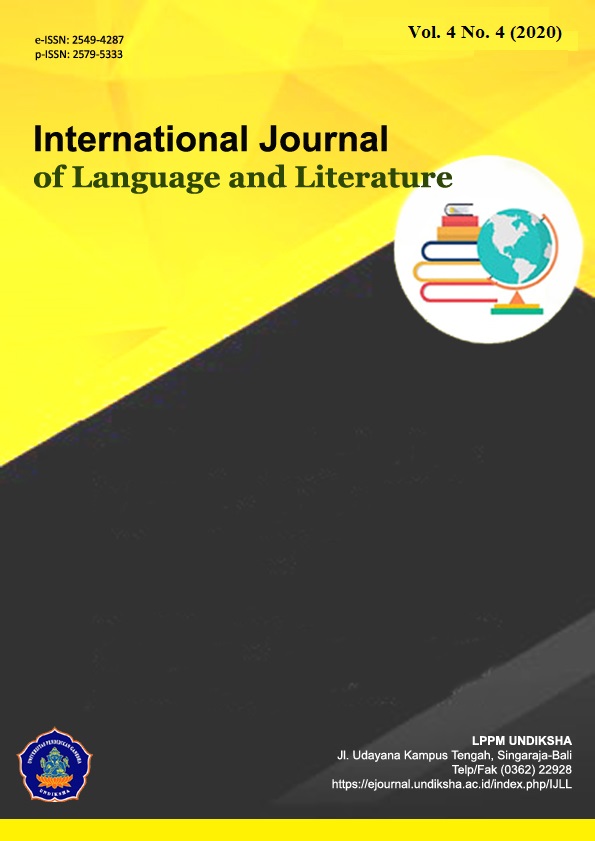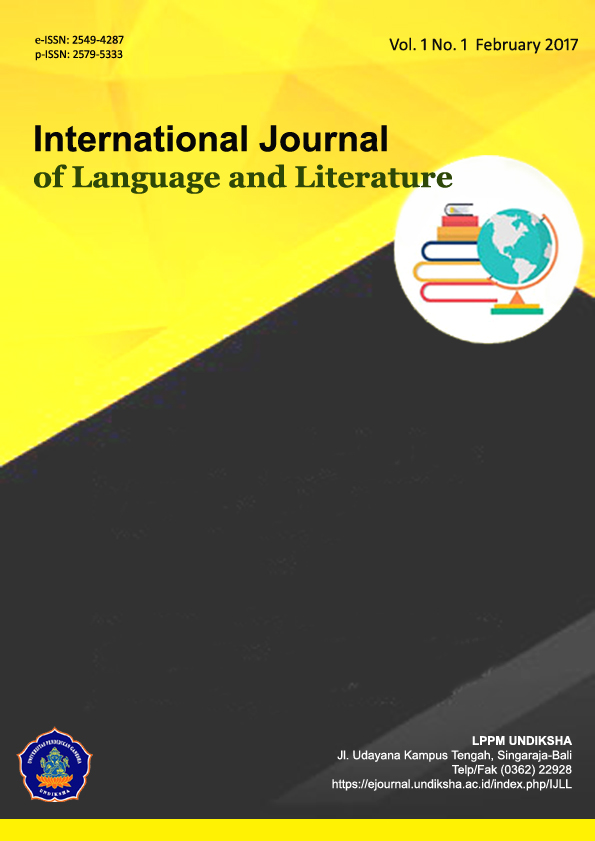EFFORTS TO INCREASE ENGLISH LEARNING ACHIEVEMENT WITH THE APPLICATION OF THE LEARNING MODEL JIGSAW COOPERATIVE
DOI:
https://doi.org/10.23887/ijll.v4i4.40884Abstract
This study aims to determine the improvement in English learning achievement of students of class XI IBB 2, SMA Negeri 1 Sukasada in the 2019/2020 Academic Year in the "English" subject through the application of the Jigsaw Cooperative Learning model.This research design uses classroom action research design. This study consisted of two cycles and each cycle consisted of two meetings, consisting of four stages namely planning, implementing, observing, and reflecting. Matters related to student assessment in cycle I and cycle II of the teacher use the Jigsaw Cooperative learning model with mastery learning adapted to the KKM which has become a school agreement, which is 78. The application of the Jigsaw Cooperative learning model, students get ample opportunities to practice skills and also give extensive time to learn movement both individually and in groups, the atmosphere of student learning during learning activities appear to be free, cheerful, passionate, and conducive. The author also documents all learning activities both in cycle I and cycle I.The results showed that English Language Learning Achievement in Class XI IBB 2 of SMA Negeri 1 Sukasada in Academic Year 2019/2020. Proven in English learning outcomes in accordance with data analysis in the first cycle and second cycle, the percentage of mastery learning classical in the first cycle of 74.8% which is in the category of not good. The percentage of mastery learning classically in the second cycle is 85.81% which is in the good category. Thus the percentage of completeness in English Learning Achievement increased by 11.01% from cycle I to cycle II, so it can be concluded that through the application of the Jigsaw Cooperative learning model in English material can be increased in class XI IBB 2 students of SMA Negeri 1 Sukasada Academic Year 2019/2020.References
Anita Lie. 1994. Cooperative Learning. Jakarta : PT. Grasindo.
Arikunto, Suharsimi; Suhardjono; Supardi. 2006. Classroom Action Research. Jakarta: PT Bumi Aksara.
Aunurrahman. 2009. Learning and Learning. Publisher: Alphabeta. Bandung.
Budiadnyana, Putu. 2004. The Influence of Jigsaw Type Cooperative Learning Model and Creative Thinking Ability on Social Studies Learning Outcomes at SDN 5 Pedungan. (Thesis), Ganesha University, Singaraja.
Hero. S. 1996. Psychology of Adolescents. Jakarta: King Grafindo Persada.
Isjoni. 2009. Cooperative Learning Effectiveness of Group Learning. Bandung : Alphabeta.
Purwanto, Ngalim. 2010. Teaching Evaluation Principles and Techniques. Bandung: PT. Rosdakarya Teens.
Rusman. 2012. Mode – Learning Model. Depok : PT Rajagrafindo Persada
Downloads
How to Cite
Issue
Section
License
IJLL Journal provides immediate open access to its content on the principle that making research freely available to the public to supports a greater global exchange of knowledge.

This work is licensed under a Creative Commons Attribution-ShareAlike 4.0 International License








